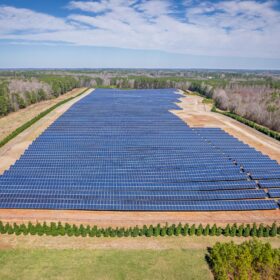Insuring against hail is all about risk management for solar project developers
In the second installment of this series, pv magazine talks with Michael Kolodner of Marsh to learn about the evolution of hail risk management and how insuring a solar project is about more than just the policy.
Minute to design it: Solar design apps save time creating proposals for owners
In a sales environment where only one in 10 viable solar projects moves forward, getting from a good idea to a firm decision by a customer needs to happen fast. Here’s how one commercial solar installer makes technology work.
FPL ‘green’ hydrogen pilot could herald a scale-up using solar and wind resources
The utility touted its massive Manatee Energy Storage Center and recommitted to a $65 million green hydrogen pilot project that could impact the future of zero-emission power generation.
Duke faces pushback over North Carolina brownfield solar project
Duke along with community and environmental groups find themselves as unlikely allies as state officials deem a 5 MW installation to be expensive and unnecessary.
Insurance for renewable energy projects adapts to more frequent and destructive disasters
As much as 70% of losses linked to solar energy systems in the past decade have occurred since 2017. The insurance industry is no longer “naive” to the risk.
New Mexico bill would set up a statewide community solar program
SB 84 would establish a 100 MW community solar program and also include a 30% annual capacity carve-out for low-income customers and related service organizations.
Biden cabinet members meet with EV infrastructure CEOs
The meeting is the latest step in the administration’s push to make the United States a global leader in electric vehicles.
Arcadia expands community solar program to Maine
The community solar program comes with a subscription model that requires no credit check, no long-term contract, and no cancellation fee, benefiting the rental market.
Duke solar plan challenged in Florida
Arguing that Duke’s Clean Energy Connections program will unfairly shift costs onto smaller customers, a group is challenging the program designed to add roughly 750 MW of utility-scale solar.
Grid access charge for solar customers proposed in Missouri
HB 539 would require customers using solar panels to pay a fee and adds a grid access fee for customers who sell generated energy back to their utility.















